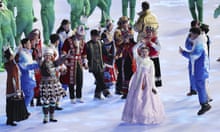China has said Australia, Britain and the US will pay a price for their “mistaken acts” in deciding not to send government delegations to the Winter Olympics in Beijing in February, in the latest warning demonstrating China’s escalating diplomatic tensions with the US and its major allies.
The US was the first to announce a boycott, saying on Monday that its government officials would not attend the February Games because of China’s human rights “atrocities”, weeks after talks aimed at easing tensions between the world’s two largest economies.
“The United States, Britain and Australia have used the Olympics platform for political manipulation,” Wang Wenbin, a spokesperson at the Chinese foreign ministry, told a regular news conference. “They will have to pay the price for their mistaken acts.”
The EU is considering its response to the growing calls for a boycott. On Thursday France’s education and sports minister, Jean-Michel Blanquer, said in a radio interview that Paris would not follow Washington’s lead.
“We need to be careful about the link between sports and politics,” Blanquer said. “Sports is a world apart that needs to be protected from political interference. If not, things can get out of control and it could end up killing all of the competitions.”
The French president, Emmanuel Macron, has sought to avoid tit-for-tat confrontation with Beijing as his country’s relationship with the US, Britain and Australia has soured since the trilateral security pact known as Aukus was announced in September.
The Australian prime minister, Scott Morrison, said Canberra’s decision not to send officials to the Games was made because of its struggles to reopen diplomatic channels with China to discuss human rights in Xinjiang province, and China’s moves to block Australian imports.
China has denied any wrongdoing in Xinjiang, home to the Uyghur Muslim minority, and said allegations of rights abuses are fabricated.
On Wednesday the US House of Representatives passed legislation to ban imports from Xinjiang over concern about forced labour, one of three measures backed overwhelmingly as Washington pushes back against Beijing’s treatment of the Uyghur community.
“China firmly opposes this,” said Gao Feng, a spokesperson at the Chinese commerce ministry, referring to the US action. “The United States should immediately stop its wrongdoing. We will take necessary measures to resolutely safeguard China’s legitimate rights and interests.”
He said the US was practising unilateralism, protectionism and bullying China in the name of “human rights”. The US stand would seriously hurt the interests of the companies and consumers of the two countries, aggravate global supply chain tension and weigh on the global economic recovery, Gao said.
The House backed the Uyghur Forced Labor Prevention Act by an overwhelming 428-1. To become law it must also pass the Senate and be signed by Joe Biden.










